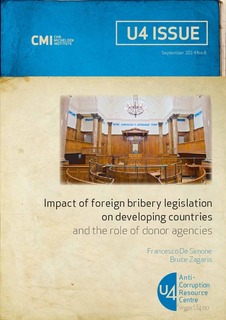Impact of foreign bribery legislation on developing countries and the role of donor agencies
| dc.contributor.author | Zagaris, Bruce | |
| dc.date.accessioned | 2018-01-04T08:19:14Z | |
| dc.date.available | 2018-01-04T08:19:14Z | |
| dc.date.issued | 2014-09-03 | |
| dc.identifier | oai:www.cmi.no:5213 | |
| dc.identifier.citation | Bergen: Chr. Michelsen Institute (U4 Issue 2014:6) 54 p. | |
| dc.identifier.uri | http://hdl.handle.net/11250/2474970 | |
| dc.description.abstract | Legislation prohibiting foreign bribery has been enacted and enforced by several countries, notably the United States and the United Kingdom, but its impact on developing countries is poorly understood. An analysis of literature and practice provides insights into factors that may help developing countries benefit from foreign bribery laws and minimize negative externalities. Lack of capacity, lack of political will, and weak flows of information emerge as key obstacles. Although donor agencies have been scarcely involved in this area, they are ideally positioned to play an important role in supporting developing countries by providing technical assistance, facilitating information flows, building political will, facilitating restitution, monitoring and managing returned funds, working with the private sector, and supporting further research. | |
| dc.language.iso | eng | |
| dc.publisher | Chr. Michelsen Institute | |
| dc.relation | U4 Issue | |
| dc.relation | 2014:6 | |
| dc.relation.ispartof | U4 Issue | |
| dc.relation.ispartofseries | U4 Issue 2014:6 | |
| dc.relation.uri | https://www.cmi.no/publications/5213-impact-of-foreign-bribery-legislation-on | |
| dc.subject | International Drivers of Corruption | |
| dc.title | Impact of foreign bribery legislation on developing countries and the role of donor agencies | |
| dc.type | Research report |
Tilhørende fil(er)
Denne innførselen finnes i følgende samling(er)
-
Publications [1488]
